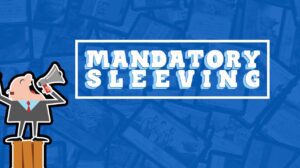Sola Fide: the Reformation – K. David Ladage
Sola Fide (Latin for ‘faith alone’) is an interesting game about The Protestant Reformation. One player takes on the role of the Pope and the other of Martin Luther. Each side has a deck of unique cards with various abilities tailored for that side. Of the cards available, the players will use a drafting mechanism to select 15 cards that will be their deck for the game. Starting with a small hand of three cards, on a player’s turn they will either play a card from their hand and do whatever action is printed there, or they will pray (i.e., draw a card from their deck into their hand).
The game has 10 regions (of which three are available at the start of the game). Each region has two sides: the nobility and the peasants. The balance of power between these two factions in each region is measured on a sliding scale of four positions (one or two in favor of the nobility; one or two in favor of the peasants). On each side there is also a set of allegiances. These can be four or five spaces with a mixture of red (allied with Martin Luther), black (allied with the Pope), or gray (neutral). Various cards will cause the balance of power to shift in one direction or the other, allow someone to change the allegiance of one of the spaces on one side of the power struggle, and so on. If, at any time, the allegiances on the side of the region where the balance of power currently rests are all set to one of the two players’ factions, that player takes that region and the victory points that come with it. As regions are claimed, more regions will open up and expand the struggle. Once all of the regions have been claimed, the game is over and the points are added up. As usual: the most points wins.
In my first game, I played the Pope. We did not do the draft, but instead started with the recommended decks. My opponent and I both felt, in the end, that the decks favored Martin Luther. But that could be bias based on the fact that I was beaten handily. Still, it was an interesting game and one I would certainly be willing to play again.
Ease of entry?:
★★★★☆ – The odd bump or two
Would I play it again?:
★★★☆☆ – Wouldn’t suggest it, but would happily play it
Read more articles from K. David Ladage.
Keops – Justin Bell
Keops (2023, Ediciones MasQueOca) is one of the most promising games I have played this year, thanks to a slow-developing series of new worker placement spaces, a handsome physical production with an oversized pyramid that players collectively build over the course of play, and a unique turn structure that allows players to pivot towards income/resource collection if they don’t want to construct city buildings, temples and other locations on a sprawling game board.
But the game is ruined by two factors: a rulebook that I’m going to politely call disastrous, and a playtime that is not doable during a normal game night with my review crew. That leaves Keops in a tricky place. I’m sure it would be interesting if I could map out a 4-5 hour session to give it the time it deserves, but it was difficult to teach myself the game, let alone the idea of teaching it to other players. I opted to do a nearly two-hour solo game (!!!) before realizing it would be a poor choice to try Keops with four players the following day with my group.
That’s a shame, because designer Manuel Martinez Aranda has some great ideas here. Unfortunately, those ideas take too much time to develop, particularly during a first round that is best described as “the juice isn’t worth the squeeze.” The timing elements around pyramid construction and Kingsburg-style defense building to ensure safety from end-of-round hordes are cool, but for every element I liked, something else would turn me off—difficult iconography, a less-than-ideal rules layout (seriously—finding things in this rulebook was one of the craziest challenges of my year), and an automa that feels badly overpowered. I wish Aranda lived next door so that he could sit with me while I navigated the rules…c’est la vie. Keops is a tantalizing example of a missed opportunity.
Ease of entry?:
★☆☆☆☆ – Rough
Would I play it again?:
★★☆☆☆ – Would play again but would rather play something else
Read more articles from Justin Bell.
Lacuna – Bob Pazehoski, Jr.
Let’s just put it this way: every judicious word of praise Andrew Lynch heaped upon the tubular wonder known as Lacuna is deserved. I questioned writing this blurb at all because he covered the game so well. But I settled on sharing a few words if for no other reason than to give the game a bump and keep it nearer the front of the collective consciousness.
Just because a game has a simple ruleset does not guarantee elegance in any form. In fact, sometimes simple just means boring. Lacuna is anything but. I explained it to my six-year-old in a few minutes, my teenage daughter in roughly the same time. Within 24 hours, they were playing together without me and teaching their brother. That doesn’t happen as often as I might like. Lacuna has a magnetic quality: the setup is fun, the theatrics are curious even to the casual observer, and the gameplay is fully engaging. I sat around trying to think of a negative, and here’s what I came up with: I will probably have to run the steamer over the playmat to take out the wrinkles. Seriously, check out Andrew’s review and find a copy.
Ease of entry?:
★★★★★ – No sweat
Would I play it again?:
★★★★★ – Will definitely play it again
Read more articles from Bob Pazehoski, Jr..
The Bridges of Shangri-La – Andy Matthews
My main gaming group does this weird thing. Rather than pick whatever game we like on our weekly game night, we have a roster of 4-5 games that we cycle through. Each person in the group gets to pick a game, and we either play that game 6 times, or decide we’re sick of it and vote it out. Then we pick a new game and start again. The upside is that I not only get to play games I wouldn’t normally pick, but I also get to play them more times than usual.
The most recent gem is The Bridges of Shangri-La, a 2003 game by Leo Colovini. The goal is simple…earn the most points by occupying the most spaces in a series of villages located on mountaintops, connected by bridges (thus the name). You claim a space by placing a “master” in a space where you already have one, or by sending students out from one village to another. But when those students journey, the bridge is destroyed behind them.
The game is a balancing act of when to spread into villages you’re already in, when to place students with existing masters, and when to travel to a neighboring village. It’s a relatively simple game, but there’s some satisfying choices as to which move to make (and when). It’s unfortunately out of print, but if you get the chance to play The Bridges of Shangri-La, don’t pass it up.
Ease of entry?:
★★★★★ – No sweat
Would I play it again?:
★★★★★ – Will definitely play it again
Read more articles from Andy Matthews.
Dungeon Mayhem: Monster Madness – David McMillan
DM:MM is a Dungeons & Dragons inspired card battler that pits various, classic monsters from the D&D universe against each other to see who will come out on top. During setup, each player selects one of the available creatures to control for the game and receives that creature’s card deck. The game has several key concepts—attack, defense, healing, etc.—that is common amongst all creatures. But, each creature has its own unique set of abilities with their own flavor.
On your turn, you draw a card and then play a card from your hand. The goal of the game is simple: reduce your opponents’ health to 0 and be the last monster standing. You do this by attacking using cards with attack symbols. However, some cards feature defense symbols and these sit in front of a player soaking up damage once they’re played. Other cards may heal you, allow you to draw extra cards, play additional cards, or execute one of your special abilities.
In the game I played, I was controlling a gelatinous cube named Blorp. One of my abilities provided me with a shield that, once destroyed, would deal direct damage to another opponent. One of the other abilities allowed me to consume shields in order to heal myself. It was unique enough that, watching my opponents playing their creatures, I felt like I was playing an entirely different game.
As far as asymmetric powers go, DM:MM knocks it out of the park. As far as being a great game goes? Well, that’s debatable. Did I have a good time? Yes. Did I ever feel particularly challenged? Not really. Would I play it again? I might if I’m with the right people.
Check out our review of Dungeon Mayhem: Monster Madness.
Ease of entry?:
★★★★★ – No sweat
Would I play it again?:
★★★☆☆ – Wouldn’t suggest it, but would happily play it














Add Comment